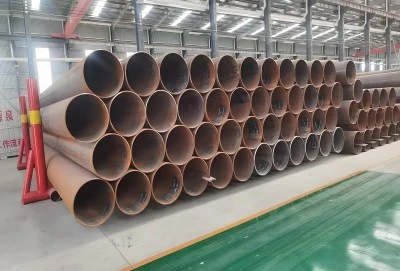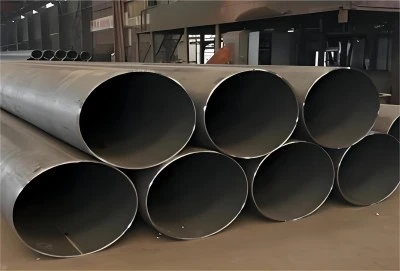API 5L X60 steel pipes represent a crucial component in modern industrial infrastructure, particularly in oil and gas transmission systems. These high-strength pipes combine exceptional mechanical properties with reliable performance characteristics, making them indispensable in various industrial applications. This comprehensive guide explores the technical specifications, applications, and sustainability aspects of API 5L X60 steel pipes while examining their role in contemporary engineering solutions.
|
|
|
Exploring X60 Pipe Specifications and Applications
API 5L X60 steel pipes are manufactured according to the stringent specifications set forth by the American Petroleum Institute (API), ensuring their reliability and performance in demanding industrial applications. The "X60" designation signifies that the pipes have a minimum yield strength of 60,000 pounds per square inch (PSI), equivalent to 414 MPa, making them highly suitable for transporting oil, gas, and water under high-pressure conditions. These pipes also exhibit impressive tensile strength, typically ranging between 517 MPa and 758 MPa, further emphasizing their ability to withstand heavy loads and stresses in challenging environments.
The chemical composition of API 5L X60 steel pipes is precisely controlled to balance strength, durability, and weldability. The steel comprises a maximum of 0.12% carbon, which helps achieve high strength without compromising ductility. Manganese content of up to 1.40% improves tensile strength and toughness, while keeping the material resistant to brittle fractures. To enhance the steel's resistance to corrosion and reduce the risk of cracking, the levels of phosphorus (0.025% maximum) and sulfur (0.015% maximum) are kept exceptionally low. This finely tuned composition ensures that the pipes maintain excellent mechanical properties while offering reliable performance across a range of operating conditions.
The manufacturing of API 5L X60 pipes involves advanced metallurgical processes designed to optimize the steel's microstructure and mechanical properties. Controlled rolling techniques are employed to achieve a uniform grain structure, which enhances the pipe's toughness and resistance to stress. Additionally, heat treatment processes such as normalizing and tempering further refine the microstructure, improving both ductility and toughness. These manufacturing steps are critical for ensuring that the pipes perform reliably under extreme temperatures and high pressures.
To maintain the highest standards of quality, X60 pipes undergo rigorous testing and inspection procedures throughout the production process. Non-destructive testing methods, such as ultrasonic testing and radiographic inspection, are routinely conducted to detect any internal or surface defects that could compromise the structural integrity of the pipes. Mechanical testing, including tensile strength, yield strength, and Charpy impact tests, ensures that the pipes meet or exceed the requirements of API 5L specifications. Hydrostatic testing is also performed to confirm the pipes' ability to withstand operational pressures without leakage or failure.
The dimensional tolerances of API 5L X60 pipes are carefully regulated to meet strict industry standards, ensuring ease of installation and consistent performance in various applications. The wall thickness is controlled within a tolerance of ±12.5% of the nominal value, which is essential for maintaining uniform strength and pressure resistance across the pipe's length. Similarly, diameter tolerances are limited to ±0.75%, ensuring compatibility with fittings and minimizing deviations that could affect the alignment of pipeline systems. These precise tolerances not only facilitate seamless integration into existing infrastructure but also reduce the risk of mechanical failures caused by misalignment or improper fit.
Sustainable Infrastructure with X60 Steel Pipe
Environmental considerations have become increasingly important in industrial infrastructure development. X60 steel pipes contribute to sustainability through their durability, recyclability, and energy-efficient production processes. The long service life of these pipes reduces the need for frequent replacements, minimizing environmental impact and resource consumption.
Modern coating technologies applied to X60 pipes enhance their resistance to corrosion and environmental degradation. Fusion-bonded epoxy (FBE) coatings provide excellent protection against soil-induced corrosion, while multi-layer polyethylene coatings offer additional mechanical protection. These protective measures extend the operational lifespan of the pipes while reducing maintenance requirements.
The installation of X60 pipes involves advanced welding techniques that minimize environmental impact. Automated welding processes reduce emissions and improve joint reliability. The pipes' high strength-to-weight ratio allows for efficient transportation and installation, reducing the carbon footprint associated with construction activities.
Life cycle assessment studies have demonstrated the environmental advantages of X60 steel pipes compared to alternative materials. The pipes' recyclability at the end of their service life contributes to the circular economy, while their resistance to damage reduces the likelihood of environmental contamination during operation.
X60 Pipe Technology: Engineering Innovations
Technological advancements in X60 pipe manufacturing continue to enhance their performance capabilities. Computer-aided design and simulation tools enable manufacturers to optimize pipe designs for specific applications. These innovations result in improved stress distribution and enhanced resistance to various loading conditions.
Smart monitoring systems integrated with X60 pipe installations provide real-time data on operational parameters. Sensors monitor pressure variations, temperature fluctuations, and structural integrity, enabling predictive maintenance strategies. This technology helps prevent failures and ensures optimal performance throughout the pipeline system.
Recent developments in joining technologies have improved the reliability of X60 pipe connections. Advanced welding procedures, including automated orbital welding systems, ensure consistent joint quality. Non-destructive testing methods utilizing digital radiography and phased array ultrasonic testing provide comprehensive inspection capabilities.
Research continues into improving the material properties of X60 steel through microstructure optimization. Advanced heat treatment processes and controlled cooling techniques enhance the pipes' resistance to hydrogen-induced cracking and stress corrosion cracking, particularly important in sour service applications.
China API 5L x60 Steel Pipe Exporter
LONGMA GROUP has established itself as a prominent manufacturer and exporter of API 5L X60 steel pipes, maintaining high production standards and quality control measures. Their manufacturing capabilities encompass pipes with outer diameters ranging from 1/2 inch to 80 inches, meeting diverse industrial requirements.
The company's X60 pipe production adheres to both PSL1 and PSL2 specification levels, providing options for different application requirements. PSL2 pipes undergo additional testing and stricter chemical composition controls, ensuring superior performance in demanding environments. LONGMA GROUP's quality assurance system includes comprehensive material testing and certification procedures.
Interested parties seeking reliable API 5L X60 steel pipe suppliers can contact LONGMA GROUP through their official communication channel at info@longma-group.com. The company provides technical support and documentation, ensuring customers receive products that meet their specific requirements and industry standards.
LONGMA GROUP's manufacturing processes incorporate modern quality control systems and testing facilities. Each production batch undergoes rigorous inspection procedures, including mechanical testing, chemical analysis, and non-destructive examination, ensuring consistency and reliability in the final product.














